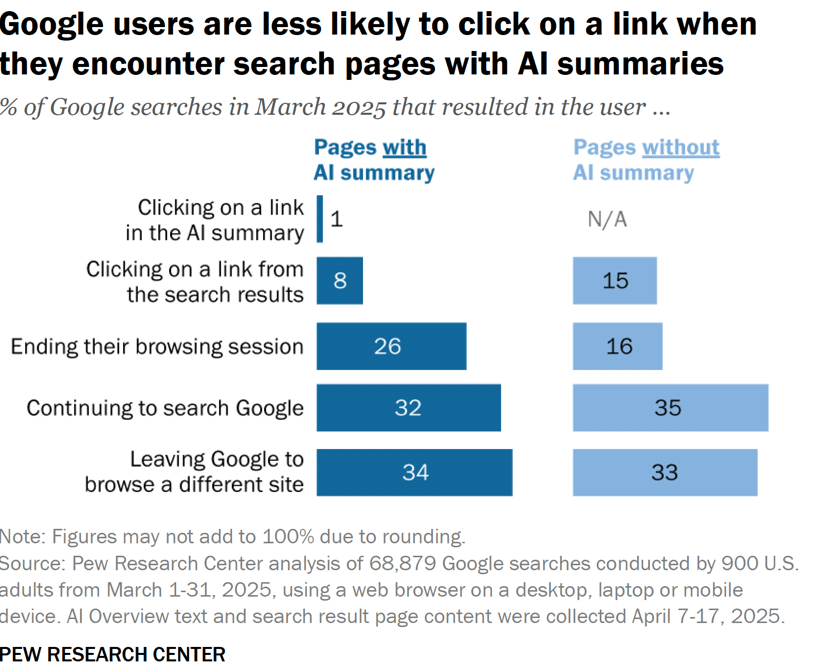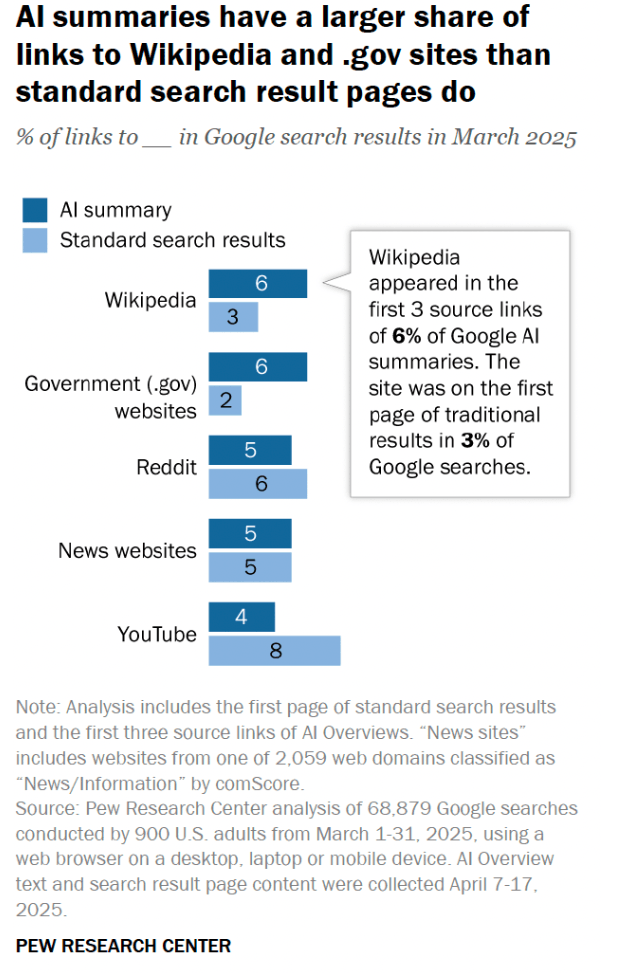Pew finds that only 1 percent of users click a source link directly from Google's AI Overviews

A new Pew Research Center study finds that Google's AI Overviews are significantly reducing traffic to external websites. When Google adds AI-generated summaries to the top of its search results, users are far less likely to click through to other sites, often ending their search with the summary.
Pew's analysis looked at the online activity of 900 U.S. adults in March 2025, tracking nearly 69,000 Google searches. The effect was striking: when an AI Overview appeared, only 8 percent of searches resulted in a click on a standard search result, compared to 15 percent without the summary. Clicking on a source link inside the AI Overview happened just 1 percent of the time.

The impact isn't limited to fewer clicks. Users shown an AI Overview were more likely to stop browsing entirely, with 26 percent ending their session on Google, compared to 16 percent for standard search results. In other words, users more often get their answers and leave without ever visiting another site.
AI Overviews show up most regularly for longer, question-based searches. Just 8 percent of one- or two-word queries triggered an AI summary, but that jumped to 53 percent for searches with ten words or more. If a question began with "who," "what," or "why," there was a 60 percent chance it would get an AI answer.
Google mostly pulls from public sources
Most AI Overviews (88 percent) link to at least three sources. Top sites include Wikipedia, government domains (.gov), Reddit, news organizations, and YouTube. The mix of sources is not drastically different from traditional results, but Wikipedia and .gov sites appear more frequently in AI Overviews, while YouTube is more prominent in standard results. Reddit and news sites each account for about 5 percent of links in both formats.

Google's reliance on news sites is already a sore spot, with publishers and the company frequently at odds over how their editorial content gets used - even within the standard search. The rise of AI-generated summaries threatens to make these battles even more heated.
There's also a bigger question for regulators: Is Google starting to act more like a media company, with all the regulatory implications that could bring? Google is likely eager to avoid that label.
Other research shows even sharper drops
Pew's study confirms that AI Overviews are reshaping how people use search, keeping them inside Google's ecosystem and reducing engagement with external content. This runs counter to Google's claims that AI answers might generate more clicks for websites.
A recent Ahrefs analysis found that AI Overviews slashed click-through rates for the top search result by 34.5 percent. Another user experience study saw even steeper declines: with AI Overviews, click-throughs to external sites fell by two-thirds on desktop and by nearly half on mobile. Many users view the AI summary as enough and leave Google without clicking on any other links.
For publishers, online shops, and content creators, this translates to a steep drop in traffic - and increased dependence on Google for advertising. The open web, once a freely linked network of information, is giving way to a centralized, (most likely) Google-controlled AI interface.
Google is planning a global rollout of AI Overviews and is already testing an even broader redesign called "AI Mode." Companies such as OpenAI and Perplexity are developing similar search systems.
AI News Without the Hype – Curated by Humans
As a THE DECODER subscriber, you get ad-free reading, our weekly AI newsletter, the exclusive "AI Radar" Frontier Report 6× per year, access to comments, and our complete archive.
Subscribe nowAI news without the hype
Curated by humans.
- Over 20 percent launch discount.
- Read without distractions – no Google ads.
- Access to comments and community discussions.
- Weekly AI newsletter.
- 6 times a year: “AI Radar” – deep dives on key AI topics.
- Up to 25 % off on KI Pro online events.
- Access to our full ten-year archive.
- Get the latest AI news from The Decoder.